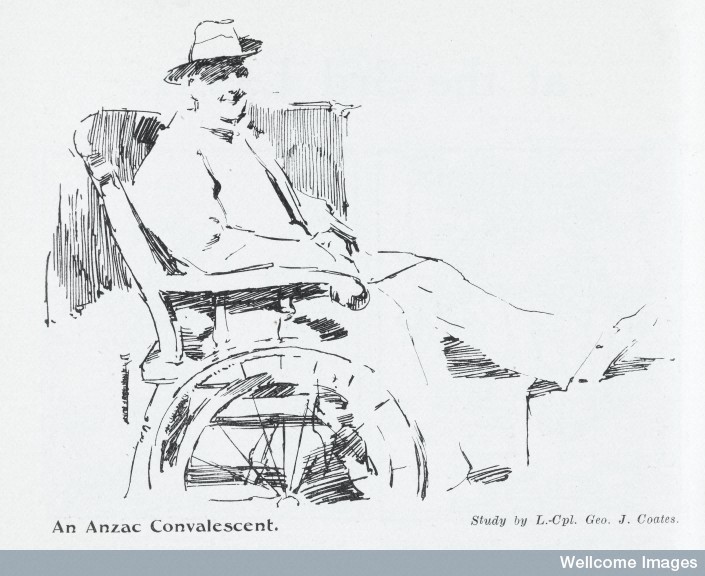Call for Papers

Drawing of 'An Anzac Convalescent' Credit: The RAMC Muniment Collection in the care of the Wellcome Library, London: L0046112
Care after the First World War
9-11 April 2018
University of Leeds
The end of the First World War saw the demobilisation and return to civilian life of millions of service personnel around the world. Governments, charities, families and individuals attempted to support, rehabilitate and reintegrate those who had served through financial provision, medical treatment and social care. In the final year of the centenary commemorations, this conference looks beyond the war to the lifelong impact of war service.
This conference examines that provision of care to veterans of the First World War and their families. It asks how, where and when care, in its various forms, was provided to and withheld from veterans around the world. It seeks to understand the motivations of those individuals and groups who provided care and to analyse the development of formal and informal networks of care.
We are pleased to announce that Professor Michael Roper and Dr Fiona Reid will be keynote speakers.
Papers discussing care for veterans of any nation after the First World War are welcome and comparative, transnational and entangled histories of care are particularly encouraged. Panel proposals are also welcome and researchers at all career stages are invited to submit a proposal.
Potential subjects for papers and panels include:
- Systems of soldier preference (in employment, soldier settlement schemes etc.)
- Disability pensions and financial provisions
- The development and work of veterans’ organisations and charities
- Competition and cooperation between care providers
- Caring for the carers: post-war provisions for medical-military personnel
- Family reintegration and care within the home
- Effects of insufficient care
- Care for prisoners of war, the families of veterans and the bereaved
- Rehabilitation of disabled veterans
- Institutional and in-patient care
- Ongoing treatment of disease and physical and psychological wounds
- Care as a disciplinary tool
- Gender in the giving and receiving of care
- The accessibility of care: issues of race, class, gender, empire and distance
- Commemoration as an act of care: remembering the disabled soldier
- Representations of care and carers in literature and the arts
The conference will include a mentoring scheme within the programme. This will involve postgraduate and early career researchers submitting an expanded draft of their paper (6000 words max.) by 15 March 2018 that will then be pre-circulated to their designated mentor. The mentor will commit to attending the mentee’s paper and then meet with the mentee to provide feedback on developing the paper for publication. Postgraduate and early career researchers will automatically be considered for the scheme. Those returning to academia from a career break and those without institutional support but who no longer qualify as early career researchers are invited to submit an expression of interest should they wish to participate. We also invite established researchers who are willing to act as mentors to contact the organisers.
Following the conference, participants will be invited to submit articles for an edited collection.
Presenters will deliver twenty-minute papers followed by time for questions. Abstracts of up to 300 words, accompanied by a short biography, and expressions of interest in the mentoring scheme should be sent to Alexia Moncrieff (University of Leeds) and Michael Robinson (University of Liverpool) at CareConference@leeds.ac.uk by 15 November 2017.
General enquiries can be sent to CareConference@leeds.ac.uk
